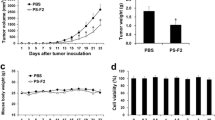Abstract
We previously isolated the novel heteropolysaccharide maitake Z-fraction (MZF) from the maitake mushroom (Grifola frondosa), and demonstrated that MZF significantly inhibited tumor growth by inducing cell-mediated immunity. In this study, we demonstrated that MZF upregulated the expression of CD80, CD86, CD83, and MHC II on bone marrow-derived dendritic cells (DCs) and significantly increased interleukin-12 (IL-12) and tumor necrosis factor-alpha production by DCs in a dose-dependent manner. MZF-treated DCs significantly stimulated both allogeneic and antigen-specific syngenic T cell responses and enhanced antigen-specific interferon-gamma (IFN-γ) production by syngenic CD4+ T cells; however, MZF-treated DCs did not affect IL-4 production. Furthermore, the enhancement of IFN-γ production in CD4+ T cells, which was induced by MZF-treated DCs, was completely inhibited by the addition of an anti-IL-12 antibody. These results indicate that MZF induced DC maturation and antigen-specific Th1 response by enhancing DC-produced IL-12. We also demonstrated that DCs pulsed with colon-26 tumor lysate in the presence of MZF induced both therapeutic and preventive effects on colon-26 tumor development in BALB/c mice. These results suggest that MZF could be a potential effective adjuvant to enhance immunotherapy using DC-based vaccination.





Similar content being viewed by others
References
Banchereau J, Steinman RM (1998) Dendritic cells and the control of immunity. Nature 392:245–252
Nencioni A, Brossart P (2004) Cellular immunotherapy with dendritic cells in cancer: current status. Stem Cells 22:501–513
Warger T, Osterloh P, Rechtsteiner G, Fassbender M, Heib V, Schmid B, Schmitt E, Schild H, Radsak MP (2006) Synergistic activation of dendritic cells by combined Toll-like receptor ligation induces superior CTL responses in vivo. Blood 108:544–550
Sugiyama T, Hoshino K, Saito M, Yano T, Sasaki I, Yamazaki C, Akira S, Kaisho T (2008) Immunoadjuvant effects of polyadenylic:polyuridylic acids through TLR3 and TLR7. Int Immunol 20:1–9
Reis e Sousa C (2006) Dendritic cells in a mature age. Nat Rev Immunol 6:476–483
Curtsinger JM, Lins DC, Mescher MF (2003) Signal 3 determines tolerance versus full activation of naive CD8 T cells: dissociating proliferation and development of effector function. J Exp Med 197:1141–1151
Ballestrero A, Boy D, Moran E, Cirmena G, Brossart P, Nencioni A (2008) Immunotherapy with dendritic cells for cancer. Adv Drug Deliv Rev 60:173–183
Underhill DM (2007) Collaboration between the innate immune receptors dectin-1, TLRs, and Nods. Immunol Rev 219:75–87
Yan J, Vetvicka V, Xia Y, Coxon A, Carroll MC, Mayadas TN, Ross GD (1999) Beta-glucan, a “specific” biologic response modifier that uses antibodies to target tumors for cytotoxic recognition by leukocyte complement receptor type 3 (CD11b/CD18). J Immunol 163:3045–3052
Brown GD (2006) Dectin-1: a signalling non-TLR pattern-recognition receptor. Nat Rev Immunol 6:33–43
Goodridge HS, Wolf AJ, Underhill DM (2009) Beta-glucan recognition by the innate immune system. Immunol Rev 230:38–50
Leibundgut-Landmann S, Osorio F, Brown GD, Reis e Sousa C (2008) Stimulation of dendritic cells via the dectin-1/Syk pathway allows priming of cytotoxic T-cell responses. Blood 112:4971–4980
Sheng KC, Pouniotis DS, Wright MD, Tang CK, Lazoura E, Pietersz GA, Apostolopoulos V (2006) Mannan derivatives induce phenotypic and functional maturation of mouse dendritic cells. Immunology 118:372–383
Ren Z, Guo Z, Meydani SN, Wu D (2008) White button mushroom enhances maturation of bone marrow-derived dendritic cells and their antigen presenting function in mice. J Nutr 138:544–550
Kim GY, Lee MY, Lee HJ, Moon DO, Lee CM, Jin CY, Choi YH, Jeong YK, Chung KT, Lee JY et al (2005) Effect of water-soluble proteoglycan isolated from Agaricus blazei on the maturation of murine bone marrow-derived dendritic cells. Int Immunopharmacol 5:1523–1532
Park SK, Kim GY, Lim JY, Kwak JY, Bae YS, Lee JD, Oh YH, Ahn SC, Park YM (2003) Acidic polysaccharides isolated from Phellinus linteus induce phenotypic and functional maturation of murine dendritic cells. Biochem Biophys Res Commun 312:449–458
Deng G, Lin H, Seidman A, Fornier M, D’Andrea G, Wesa K, Yeung S, Cunningham-Rundles S, Vickers AJ, Cassileth B (2009) A phase I/II trial of a polysaccharide extract from Grifola frondosa (Maitake mushroom) in breast cancer patients: immunological effects. J Cancer Res Clin Oncol 135:1215–1221
Nanba H, Hamaguchi A, Kuroda H (1987) The chemical structure of an antitumor polysaccharide in fruit bodies of Grifola frondosa (maitake). Chem Pharm Bull 35:1162–1168
Ito K, Masuda Y, Yamasaki Y, Yokota Y, Nanba H (2009) Maitake beta-glucan enhances granulopoiesis and mobilization of granulocytes by increasing G-CSF production and modulating CXCR4/SDF-1 expression. Int Immunopharmacol 9:1189–119615
Masuda Y, Inoue M, Miyata A, Mizuno S, Nanba H (2009) Maitake beta-glucan enhances therapeutic effect and reduces myelosupression and nephrotoxicity of cisplatin in mice. Int Immunopharmacol 9:620–626
Masuda Y, Matsumoto A, Toida T, Oikawa T, Ito K, Nanba H (2009) Characterization and antitumor effect of a novel polysaccharide from Grifola frondosa. J Agric Food Chem 57:10143–10149
Inaba K, Inaba M, Romani N, Aya H, Deguchi M, Ikehara S, Muramatsu S, Steinman RM (1992) Generation of large numbers of dendritic cells from mouse bone marrow cultures supplemented with granulocyte/macrophage colony-stimulating factor. J Exp Med 176:1693–1702
Kim E, Kim SH, Kim S, Cho D, Kim TS (2008) AIMP1/p43 protein induces the maturation of bone marrow-derived dendritic cells with T helper type 1-polarizing ability. J Immunol 180:2894–2902
DeKruyff RH, Fang Y, Wolf SF, Umetsu DT (1995) IL-12 inhibits IL-4 synthesis in keyhole limpet hemocyanin-primed CD4+ T cells through an effect on antigen-presenting cells. J Immunol 154:2578–2587
Lambert LA, Gibson GR, Maloney M, Durell B, Noelle RJ, Barth RJ Jr (2001) Intranodal immunization with tumor lysate-pulsed dendritic cells enhances protective antitumor immunity. Cancer Res 61:641–646
Kalinski P, Hilkens CM, Wierenga EA, Kapsenberg ML (1999) T-cell priming by type-1 and type-2 polarized dendritic cells: the concept of a third signal. Immunol Today 20:561–567
Amsen D, Blander JM, Lee GR, Tanigaki K, Honjo T, Flavell RA (2004) Instruction of distinct CD4 T helper cell fates by different notch ligands on antigen-presenting cells. Cell 117:515–526
Vieira PL, de Jong EC, Wierenga EA, Kapsenberg ML, Kalinski P (2000) Development of Th1-inducing capacity in myeloid dendritic cells requires environmental instruction. J Immunol 164:4507–4512
Giermasz AS, Urban JA, Nakamura Y, Watchmaker P, Cumberland RL, Gooding W, Kalinski P (2009) Type-1 polarized dendritic cells primed for high IL-12 production show enhanced activity as cancer vaccines. Cancer Immunol Immunother 58:1329–1336
Trinchieri G (2003) Interleukin-12 and the regulation of innate resistance and adaptive immunity. Nat Rev Immunol 3:133–146
Gao FG, Wan da F, Gu JR (2007) Ex vivo nicotine stimulation augments the efficacy of therapeutic bone marrow-derived dendritic cell vaccination. Clin Cancer Res 13:3706–3712
Gonzalez-Carmona MA, Lukacs-Kornek V, Timmerman A, Shabani S, Kornek M, Vogt A, Yildiz Y, Sievers E, Schmidt-Wolf IG, Caselmann WH et al (2008) CD40 ligand-expressing dendritic cells induce regression of hepatocellular carcinoma by activating innate and acquired immunity in vivo. Hepatology 48:157–168
Rogers NC, Slack EC, Edwards AD, Nolte MA, Schulz O, Schweighoffer E, Williams DL, Gordon S, Tybulewicz VL, Brown GD, Reis e Sousa C (2005) Syk-dependent cytokine induction by Dectin-1 reveals a novel pattern recognition pathway for C type lectins. Immunity 22:507–517
Herre J, Marshall AS, Caron E, Edwards AD, Williams DL, Schweighoffer E, Tybulewicz V, Reis e Sousa C, Gordon S, Brown GD (2004) Dectin-1 uses novel mechanisms for yeast phagocytosis in macrophages. Blood 104:4038–4045
Acknowledgments
We thank Yukiguni Maitake Co., Ltd. for supplying maitake. We also thank F. Yamamoto for supporting our experiment.
Author information
Authors and Affiliations
Corresponding author
Rights and permissions
About this article
Cite this article
Masuda, Y., Ito, K., Konishi, M. et al. A polysaccharide extracted from Grifola frondosa enhances the anti-tumor activity of bone marrow-derived dendritic cell-based immunotherapy against murine colon cancer. Cancer Immunol Immunother 59, 1531–1541 (2010). https://doi.org/10.1007/s00262-010-0880-7
Received:
Accepted:
Published:
Issue Date:
DOI: https://doi.org/10.1007/s00262-010-0880-7




